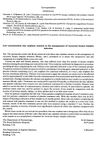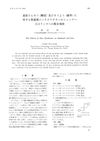 1 citations,
February 2017 in “MOJ bioequivalence & bioavailability”
1 citations,
February 2017 in “MOJ bioequivalence & bioavailability” Treating hair loss effectively may require a multi-sided approach, using different treatments together, and topical treatments could be more effective and safer than oral ones.
 2 citations,
September 2023 in “Scientific reports”
2 citations,
September 2023 in “Scientific reports” The nanocomposite films with vitamins and nanoparticles are promising for fast and effective burn wound healing.
 June 2024 in “The Open dermatology journal”
June 2024 in “The Open dermatology journal” The herbal extract is as effective and safe as 3% minoxidil for treating hair loss.
 January 2023 in “Theranostics”
January 2023 in “Theranostics” A patch with curcumin-zinc can improve hair growth and health by delivering beneficial particles to the skin, increasing hair follicles, and reversing effects of a hair loss hormone.
 January 2020 in “Medpulse International Journal of General Medicine/Medpulse International Journal of Medicine”
January 2020 in “Medpulse International Journal of General Medicine/Medpulse International Journal of Medicine” Premature graying of hair is often linked with other health issues, but treatment with biotin, zinc, and calcium pantothenate is not very effective.
21 citations,
June 1983 in “Pediatric clinics of North America/The Pediatric clinics of North America” Zinc is vital for skin health and overall body functions, and deficiency can cause serious health issues.
 18 citations,
December 2010 in “Journal of Trace Elements in Medicine and Biology”
18 citations,
December 2010 in “Journal of Trace Elements in Medicine and Biology” Women with AGA have more androstenedione and dihydrotestosterone, less copper and zinc; copper imbalance affects AGA; treatment improves hormones and minerals.
11 citations,
January 2017 in “Journal of research in pharmacy practice” The combination of zinc sulfate and calcium pantothenate effectively controls early-stage hair loss.
 10 citations,
August 2021 in “Journal of Cosmetic Dermatology”
10 citations,
August 2021 in “Journal of Cosmetic Dermatology” Most patients with telogen effluvium had low iron and vitamin D levels; iron supplements were commonly prescribed.
 3 citations,
January 1985 in “British Journal of Dermatology”
3 citations,
January 1985 in “British Journal of Dermatology” Zinc sulphate solution was not effective in reducing the number, duration, or severity of recurrent herpes simplex infections.
 January 2024 in “Australasian journal of dermatology (Print)”
January 2024 in “Australasian journal of dermatology (Print)” A boy's hair turned red because of genetic mutations, not lack of zinc.

The new gel with Zinc Oxide nanoparticles and finasteride shows promise for treating hair loss when applied to the skin.
 January 1978 in “Yukagaku”
January 1978 in “Yukagaku” Zinc pyrithione in shampoo or rinse reduces dandruff and itching.
 56 citations,
January 2013 in “International journal of trichology”
56 citations,
January 2013 in “International journal of trichology” Zinc supplements may be needed to treat hair loss in hypothyroidism.
22 citations,
December 1992 in “The journal of pediatrics/The Journal of pediatrics” Zinc supplements improved hair and skin conditions in two patients.
 11 citations,
February 2019 in “Journal of Cosmetic Dermatology”
11 citations,
February 2019 in “Journal of Cosmetic Dermatology” Low zinc and biotin levels linked to male hair loss; supplements may help.
 9 citations,
April 2023 in “Journal for Research in Applied Sciences and Biotechnology”
9 citations,
April 2023 in “Journal for Research in Applied Sciences and Biotechnology” Zinc is important for growth and health in animals, plants, and humans, and not having enough can cause various problems.
 1 citations,
November 2023 in “Journal of cosmetic dermatology”
1 citations,
November 2023 in “Journal of cosmetic dermatology” The new anti-dandruff shampoo with ketoconazole-coated zinc oxide nanoparticles is more effective against dandruff.
1 citations,
December 2022 in “Bioactive Materials” The microneedle patch with quercetin, zinc, and copper effectively promotes hair regrowth for androgenic alopecia.
1 citations,
January 2017 in “Hair therapy & transplantation” Topical zinc-thymulin is safe and effective for treating male pattern baldness.
 June 2023 in “Italian journal of dermatology and venereology”
June 2023 in “Italian journal of dermatology and venereology” The oral supplement improved hair loss in patients with telogen effluvium.
Adding zinc to papaya extract speeds up wound healing.
 January 2024 in “Biochemical and Biophysical Research Communications”
January 2024 in “Biochemical and Biophysical Research Communications” Lack of zinc can cause hearing loss by damaging important parts of inner ear cells in mice.
 January 2022 in “Social Science Research Network”
January 2022 in “Social Science Research Network” A new patch that releases quercetin, copper, and zinc ions under the skin can effectively treat hair loss by promoting hair follicle regeneration.
 April 2016 in “Journal of The American Academy of Dermatology”
April 2016 in “Journal of The American Academy of Dermatology” People with hair loss have low zinc levels; zinc supplements and laser therapy may help.
 57 citations,
August 2003 in “British Journal of Dermatology”
57 citations,
August 2003 in “British Journal of Dermatology” Minoxidil and pyrithione zinc combo most effectively increases hair density.
 8 citations,
April 2011 in “Surgery today”
8 citations,
April 2011 in “Surgery today” A substance called sodium zinc dihydrolipoylhistidinate can significantly reduce hair loss caused by chemotherapy in rats.
 September 2024 in “Journal of Family Medicine and Primary Care”
September 2024 in “Journal of Family Medicine and Primary Care” Primary health physicians in Saudi Arabia need better guidelines for treating hair loss with vitamins and minerals.
 September 2018 in “International Journal of Dermatology”
September 2018 in “International Journal of Dermatology” People with alopecia areata often have lower levels of zinc and vitamin D.
13 citations,
March 2012 in “The American Journal of Surgery” Modified laparoscopic sleeve gastrectomy effectively controls diabetes and treats obesity with minimal complications.






















